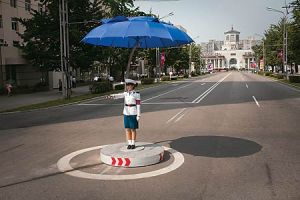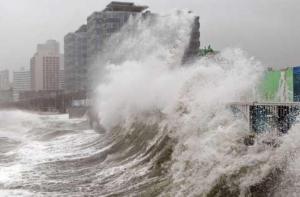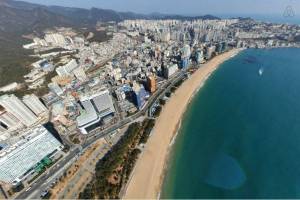by Chris Tharp
(The following is an excerpt from my recently-published book, The Worst Motorcycle in Laos: Rough Travels in Asia, available now via Amazon and other fine booksellers. Enjoy.)
I shouldn’t have eaten the curry. I should have just let it be. It was nasty stuff—putrid, watery, and unnaturally green—like some sort of chunky algae bloom. The chicken was undercooked, and shards of stringy bamboo floated in the swamp of a sauce. I should have taken the whole thing out back, behind the fetid shack containing the joint’s kitchen, and poured it onto the ground for the village’s free-roaming pigs to slop up. I should have just gone to bed unfed and hungry. After all, the human body can go weeks without any food at all. What was one night? I’d be fine. Despite some lean times in the past, my pampered American ass had never known real, prolonged hunger—yet ten hours without a bite and my body was in panic mood. I was ravenous and that was that, so I sucked down every last oily drop.
It was now two days later and my intestinal tract was in a state of civil war. I was nauseous and fevered and the spigot had opened wide. Hot blasts—explosive, violent, and unpredictable—rumbled forth in unstoppable volleys from deep within my bowels. I was sweaty, weak, unshaven, and filthy. I had been wearing the same pair of olive shorts and faded green Seattle Supersonics T-shirt for over a week now, ever since my backpack—containing the rest of my clothes, along with three hundred dollars cash —had disappeared from the belly of a long-distance bus. My one pair of underwear had since been abandoned in a guesthouse trash bin. I was in a state. For all of her tropical emerald splendors, Laos—Southeast Asia’s sleepiest country—had treated me roughly. It was time to get the hell out, so I boarded a white minibus that trundled across the border and into the realm of her tough little sister, Cambodia.
The road south was a moonscape of craters and potholes, punctuated by large, loose stones. The going was slow and bumpy, constantly rocking and jostling the poor bus’s chassis, not to mention its unfortunate cargo of passengers. I settled into the seat and gripped tightly, shuddering with each groan of the vehicle’s frame. Every crevasse in the road sent shockwaves through my ravaged body and agitated the liquids within. I then felt the furnace ignite: Old Faithful was ready to blow, but alas, there was no toilet, no bucket—nothing on this dwarf of a bus. I’d have to ride it out. So I locked my jaw and endured each bump in grim silence, focusing my thoughts into one mantra that echoed throughout my being over the next two hours of rutted road hell:
Keep it clenched. Keep it clenched. Keep it clenched.
The need to release came in waves, which prompted all the muscles in my body—not just those at the gate—to flex and tighten as I staved off the overwhelming pressure. The old bus shook and shuddered as it groaned down the calamity of a road, while I just concentrated on breathing and keeping the gasket sealed. It took every reserve of willpower and discipline, but I eventually managed to gain control. I only hoped—not just for my sake, but also that of my fellow passengers—that I could maintain this upper hand. The alternative would be catastrophic.
We rolled down the dusty track through desiccated rice fields. It was the middle of dry season, and the lush Cambodian countryside was now painted shades of brown. The air was grey and hazy from the farmers slash-burning their fields. Buffalo stood in the dusty paddies, some tied to posts, stupidly staring as we passed by. At one point we reached a small settlement; the bus pulled off to the side, stopped, and the driver opened the door.
Salvation.
I grabbed my small green bag containing my valuables—the only thing that hadn’t walked away during that fateful journey in Laos—and made my way off the vehicle. We had stopped in front of an open-air wooden shack selling some bottled water, canned drinks, cigarettes, bags of chips and cookies, as well as other snacks. I guessed this was what passed for a truck stop in Cambodia. We were suddenly set upon by four teenage girls carrying baskets of white boiled eggs on their heads, which they quickly brought down for our perusal.
“You buy-eee? You-buy-eee? You buy-eee?” they pleaded in a singsong chorus. I ducked away, weighed down by more immediate and pressing thoughts. I looked to the man sitting behind the drinks table. He wore shorts and sandals and puffed away on a cigarette. He stared back with bloodshot indifference.
“Toilet? Toilet?” I pleaded.
He pointed to a cardboard sign tacked on a support beam near his head. It read, WC, followed by a crudely drawn arrow pointing to the left.
“Thanks,” I nodded, and headed off.
“NO! NO! NO!” The man was on his feet as I turned back. He held out his palm and slapped it with his other hand.
Of course. There is no such thing as a free shit in Southeast Asia: pay to spray.
“Okay okay. How much?” I hissed.
He jerked his finger back toward the sign. I had missed the fine print, scrawled tiny underneath: 1,000 RIEL.
I took out my wallet and peered inside. I had a small wad of Lao kip and some US dollars, but no Cambodian riel. I had neglected to convert any cash at the border.
His eyes bulged from his sockets as he growled again for money.
“Lao kip? Lao kip okay?” I asked.
“No no no no.” He waved the bills away.
“Uh… dollars? American dollars?”
“Dollars yes!” His hand became possessed with renewed vigor.
I fingered through my greenbacks, looking for a dollar bill. Twenty, twenty, ten—no! Shit! Twenty… please—okay—one dollar!”
I handed him the wrinkled note and he made change, returning a crumpled fistful of nearly worthless riel.
I fled without a “thanks” and headed toward the toilet, feeling a steamy gurgling inside. It was on. Another sign directed me around the side of the building, where things got very muddy. I slogged toward the rickety out structure on which a WC sign had been nailed, taking care not to step in the most treacherous bits. Scrawny chickens clucked, scratched, and pecked at the edge of the muck, while their terrorized offspring scurried and screeched at the sight of me. A fat black pig grunted just feet away. Clumps of its dark shit punctuated the even darker mud.
When I finally reached the haven of the lone toilet stall, I grabbed the crude wooden handle and gave the door a yank. It moved a half inch then stopped. It was latched from inside.
“For fuck’s sake.” I mumbled, squeezing my ass cheeks together with the strength of an Olympic wrestler.
I shuffled my weight and looked to the smoky sky. “Please please please please please.”
My eyes went back to the door in a search for movement. Nothing. Okay, okay. No problem. I figured that another one of the bus’s passengers must be inside, so it couldn’t take too long. I drummed on my thighs and rocked in place as I waited for him to emerge.
“Come on come on come on come on come on.”
No one emerged.
My patience exhausted, I knocked on the door. “Hello? Hello?”
I could hear some shuffling inside, followed by an audible but unintelligible response.
“Hello?”
Movement.
“Please. It’s an emergency!”
More movement.
I knocked again. This was met with a garbled yell, causing me to step away.
I stood in agony for three more minutes. I sighed and grabbed at my hair. I growled deep in my throat. I moaned and spit. I looked to the static door and imagined laser beams shooting forth from my eyes, turning the thing to ash in a matter of seconds.
“Jesus cunting Christ.”
I approached once more and slammed with an open palm.
“HEY! HEY!”
Again, I was met with human voice, but again, I couldn’t make out what it was saying. Was it even language? It sounded like some sort of groaning. Whoever was in there was my only hope.
I banged again, harder.
“OPEN THE FUCK UP!!!”
Nothing.
I waited for another minute, or two. The situation was now untenable: it simply could not go on any longer. I looked down at my feet, at the wet earth. Surely I could just squat, right there, and release the boiling contents of my bowels onto this already filthy mud. It must have been done many times before.
Fuck it.
I thumbed the loop of my belt and began to yank it out of the buckle, only to be startled by a prolonged, loud—
HONNNNNNNNNNNNNNNNK!
It was the minibus. I looked over to the road. The little white bus had begun to pull out. The driver—along with most all of the passengers—was looking my way.
HONNNNNNNNNNNNNNNNNK!
He angrily waved for me to come back on board. I was holding them all up.
“NO NO NO NO NO NO!”
HONNNNNNNNNNNNNNNNNK!
I slunk back onto the bus, defeated, demoralized, and ready to murder. I had yet to unleash the volcano simmering in the tubes of my ass, and it was another two hours’ rugged ride to our destination. I gingerly sat back down in my seat and cursed our animal state. Why is so much of life dictated by base physical needs? Eating, breathing, fucking, itching, hurting, pissing, and shitting? All of these things form a kind of tyranny that none of us can escape, and I was now locked away in its harshest gulag.
As the bus began to pull onto the road, I threw my gaze one last time toward the rickety outhouse. The door suddenly burst open and out staggered a man—a wretched, ugly man—steeping in obscene amounts of booze, or worse. He was heinously dirty and clothed in greasy, stained rags. His hair was long, matted, and wild, and a wispy beard sprung haphazardly from his chin. His eyes were empty black holes, and he swayed from side to side in a half-assed attempt to stay upright. The guy probably didn’t even know what country he was in, let alone village or toilet, and he had the appearance of someone in the wicked throes of a six-day gas-huffing binge. Who knows? Maybe that’s what he was doing in outhouse. Whatever the case, I was shit out of luck.
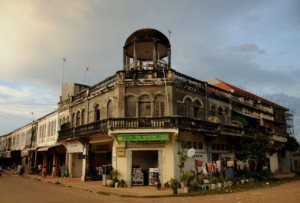
The town of Kratie—appropriately pronounced “Crotchy”—is a rotting and neglected burg built up on the muddy banks of the Mekong River. After several hours of enduring a slow grind over one of Asia’s worst-maintained roads, we had made it—or, more importantly—I had made it. The village was saved! The dike managed to hold back the sea! A catastrophe was indeed averted, and as soon as the bus pulled into that sad little station, I jumped out and broke into a near-sprint (as much as could be allowed), looking for any sign reading “Hotel.” I frantically stumbled along the town’s crumbling sidewalks, scanning the streetscape for any hint of shelter, and lucky for me it, didn’t take long before my wish came to fruition. There it was, like a golden palace in the clouds, above which sang a host of harmonizing angels:
KRATIE HOTEL
I shot through the front door and slapped my passport on the counter.
“How much for your best room?”
“Fifteen dollars, sir.”
“Done.”
I grabbed the key and limped up the stairs to my fourth-floor room—this hotel’s version of a presidential suite. Upon opening the door I was greeted with a cavernous cell—high ceilings, two beds, and a couple of paintings depicting glacial mountain scenes—so Khmer! The artwork in Southeast Asian hotels is always a random mish-mash: shots of Norwegian fjords, sultry African women, and glossy photographs of soccer players or Italian sports cars. It’s actually rare to see a painting that actually reflects the local scenery, say, of a boat floating down a palm-tree lined river, elephants frolicking in a jungle pool, or renditions of tuk-tuks making their way down steamy, crowded side streets.
I tossed my small green bag onto one of the beds and made straight for the bathroom. My shorts were off before I even got to the door and I was on the toilet like the finalist of a high-stakes game of musical chairs. As soon as I felt the first trace of the cool seat on my cheeks, I let loose, blasting the white ceramic bowl with the strength and velocity of a fire hose. This was a pure, concentrated cascade that reverberated around the room with sonic intensity. It sounded like TV static followed by bursts from a large-caliber machine gun. I was astounded: never had I heard fluids leaving the body with such total ferocity. When nature wants to expel, she does it something fierce. I was a human pressure washer, and was glad that I shelled out those extra bucks for the extra-strength, triple-engineered toilet. This was the first in what would be many unholy volleys that night, so I was putting it to the test.
The relief I felt after that session went straight to the center of my soul. I was still weak and pukey, but for the first time all day I could relax my muscles, which ached from spending hours in a constant state of tension. I took the opportunity to take a quick meander around central Kratie, which was a crowded town. I felt eyes upon me as I strolled through the streets looking for a pharmacy. Tuk-tuks and motorbikes slowed down to take me in. Across from the hotel was the town’s central market; the ancient black roof looked like it would cave in at any minute. An army of small motorbikes was parked outside in uneven lines and jagged clusters. Rain-stained streaks wept down the sides of buildings and huge patches of black mildew bloomed like cancer. The whole place reeked of provincial decay.
After buying some much-needed water, I found a small pharmacy that consisted of one counter underneath a flickering fluorescent light. A short, chubby woman sat on a stool and addressed me in Khmer. I looked at her, pointed to my asshole, rubbed my stomach, shook my head and said, “No. No.”
She knew the gig right off, got up, and handed me a packet of six stupidly huge white pills.
Sorted.
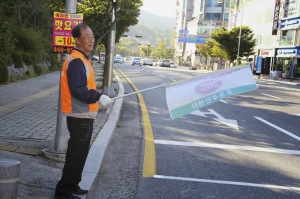 time, South Korean CARS-related deaths have consistently been among the highest of all OECD nations,” said Doctor Park Jin-hyuk.
time, South Korean CARS-related deaths have consistently been among the highest of all OECD nations,” said Doctor Park Jin-hyuk.

